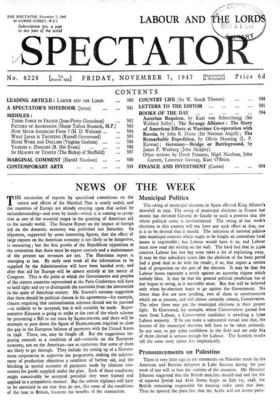NEWS OF THE WEEK
THE succession of reports by specialised committees on the nature and effects of the Marshall Plan is nearly ended, and the countries of Europe are already entering upon that ordeal by misunderstanding—and even by insult—which it is coming to recog- nise as one of the essential stages in the granting of American aid to the outside world. The Nourse Report on the impact of foreign aid on the domestic economy was published last Saturday. Its afgument, supported by some interesting figures, that the effect of large exports on the American economy is not likely to be dangerous, is reassuring ; but the first growls of the Republican opposition at the contention that there must be export controls and a maintenance of the present tax revenues are not. The Harriman report is emerging at last. By early next week all the information to be supplied by the Administration will have been handed over, and after that aid for Europe will be almost entirely at the mercy of Congress. This is the point at which the Governments and peoples of the sixteen countries represented at the Paris Conference will have to hold tight and try to distinguish the essentials from the inessentials in the spate of American oratory. Mr. Stassen's extreme suggestion that there should be political clauses in the agreements—for example, clauses requiring that nationalisation schemes should not be pursued —is unlikely to be accepted, but it will certainly be made. Repre- sentative Knutson is going to strike at the root of the whole scheme by presenting a Bill to cut taxes by $4,000,000,000, and there will be attempts to pare down the figure of $6,000,000,000 required to close the gap in the European balance of payments with the United States in 1948. These, too, may be fought off. But the suggestions im- posing controls as a condition of aid—controls on the European economy, not on the American—are so numerous that some of them are likely to get through. They include the setting up of a Govern- ment corporation to supervise the programme, making the achieve- ment of production objectives a condition of further aid, and the blocking in special accounts of payments made by ultimate con- sumers for goods supplied under the plan. Each of these conditions might conceivably be accepted provided they were framed and applied in a sympathetic manner. But the utrnost vigilance will have to be exercised to see that they do not, like some of the conditions of the loan to Britain, frustrate the benefits of the transaction.


































